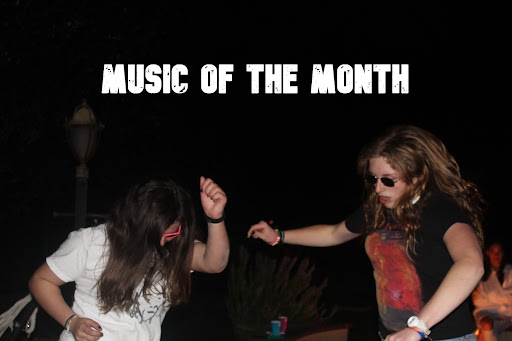Music of the Month: April
A look at our top songs for the month of April.

Cali and Brianna compile a list of their ten favorite songs and shared picks this month and go in depth with them.
May 3, 2022
Happy April! It’s sad to say, but this is the penultimate issue of “Music of the Month” for this school year. As always, we have chosen our favorite songs from this month and gone in-depth with them. However, instead of our three honorable mentions, we decided to have three shared picks: songs that we both have been obsessing over the past month, and we collaboratively wrote these picks.
Cali’s picks:
“I’m Above” by Mad Season, “Above” (1995):

Following the death of Kurt Cobain, the genre known as grunge was quickly on a downward spiral, as the masses began to turn to hip hop, pop-punk, and other genres. Grunge bands continued to play and record albums, but mainstream listeners began to lose interest. In the midst of this oblivion, Mad Season, a grunge supergroup, formed as a side project for many Seattle musicians; it consisted of Alice in Chains lead vocalist Layne Staley, Pearl Jam’s lead guitarist Mike McCready, both Mark Lanegan (co-vocals) and Barrett Martin (drums) of the Screaming Trees joined, and a musician unknown at the time, John Baker Saunders on bass. The nearly six-minute-long, “I’m Above” is memorable through the heavenly harmonies of Staley and Lanegan that exhibit the distinctness and richness of the two voices. The verses are midtempo and are laced with McCready’s smooth guitar work that becomes a tangle of driving power chords as Martin builds up the rhythm with his pounding drums, forming a crescendo for the song to enter the pre-chorus. After the chorus, McCready takes over and plays an acoustic-sounding solo that adds to the overall shifting and dynamic moods of the tune. The number ends in a turbulent, yet rapturous, repetition of the chorus by Staley that gives fans of the so-called Seattle sound a look back into the forgotten age of grunge.
“Love of My Life” by Queen, “A Night At The Opera” (1975):

A sweet and heartfelt piano ballad that evokes the melancholic and painful feelings associated with feeling abandoned by one’s soulmate. This lulling number uses orchestral instruments such as the harp, which arpeggiates right before Freddie Mercury enters with his enchanting and unmatchable expressive voice. The truly spiritual track is one of the most transcendent and emotionally provoking of Queen’s illustrious and diverse catalog. The harmonies throughout the track transfix the listener and add to the generally serious mood. The bridge combines the harmonies and the painstaking lyrics that make the listener encapsulate the feelings of betrayal Mercury was experiencing at the time. Following the bridge, Brian May plays a beautifully composed guitar solo that ties the sentiment into the remainder of the song. Although Mercury is famously praised for his vocal prowess, he displays his ability as a pianist with the complex, yet soothing, nature of the piano chords played. The composition ends with melodic vocals, the resounding piano, and the return of the harp. This tune indelibly leaves a mark on whoever is listening to it and can bring anyone to tears through the expressed remorse of losing someone that means the world to them.
“Schizophrenia” by Sonic Youth, “Sister” (1987):

As the opening track on Sonic Youth’s fourth album, “Schizophrenia” takes the listener to a warm and comforting place, despite the controversial title. The song is written in an ode to bassist and co-vocalist, Kim Gordon’s older brother Keller, who was diagnosed with paranoid schizophrenia as a young adult. The song begins with a pulsing drum section that is soon taken over by Thurston Moore and Lee Ranaldo’s mellow yet poignant guitars that play in sync during the verse but break away from each other during the rest of the song to create a symphonic sound. Moore’s calming vocals throughout the verses and the tone of the guitars emit a sense of dreaminess and intrigue that resonate with anybody listening as he sings evocative lyrics like, “‘I can feel it in my bones,/schizophrenia is taking me home,’”. The dueling guitars that continue to carry on after the first verse perfectly orchestrate Gordon’s bridge where she sings in her signature Sprechstimme voice and expresses the struggles her brother faced with his mental state by singing from his perspective. Following Gordon’s bridge, the band breaks into a controlled fit of noise that incorporates their classic noise and art-rock sound. This aggressive break eventually fades into a blissful outro that gradually slows until Moore’s churning guitar is the only thing audible. One of Sonic Youth’s more well-known songs, “Schizophrenia” is a truly unique track that captures the listener through the intense feelings and experimental, yet relaxing, instrumentals of the composition.
“Mistakes Like Fractures” by Knocked Loose, “Mistakes Like Fractures” (2019):

First issued as a single before the release of Knocked Loose’s “A Different Shade of Blue” album, “Mistakes Like Fractures” is simply the embodiment of heaviness. The adrenaline-fueled hardcore group truly delivers on this track with the crunching riffs and harmonic squeals of the guitar, screaming vocals, and many satisfying breakdowns. The track changes tempos many times and begins in a slower fashion, but instantaneously speeds up as singer Brian Garris and the band join Isaac Hale’s menacing guitar playing. The bridge is nearly made up of Garris’ acapella screams, as it is only accompanied by resonating and fading guitar noise, but this shortly picks up and leads to a breakdown that includes the sludgy guitar and occasional scream delivered by Garris. Throughout the duration of the song, Pacsun Kaine showcases his drumming abilities as he smoothly transitions between his rhythmic and coinciding playing to the elusive double bass heard in the verses. The emergence of Knocked Loose in the metal scene has given metalheads and listeners of the genre, in general, a rejuvenating taste of hardcore with a contemporary metal twist. “Mistakes Like Fractures” has easily become a pit classic at live shows, one of the band’s more well-known songs, and a fan favorite.
“Across The Sea” by Weezer, “Pinkerton”(1996):

As track five on Weezer’s critically condemned sophomore album, “Across The Sea” is overflowing with the raw emotions of yearning and alienation, a constant theme heard throughout “Pinkerton.” This dynamic track begins with a barely audible piano and violin, which are soon taken over by a distorted guitar as Rivers Cuomo starts singing in his melancholy voice. The choruses are simple, but anthemic, with lyrics like, “Why are you so far away from me?/I need help when you’re way across the sea,” that are tempting for anybody to scream at the top of their lungs. The chorus and verse are bridged together by Cuomo’s subtle guitar licks that are synchronized with a small piano section. Following the second chorus, Cuomo breaks into a hard-hitting, yet emotional solo, that fades into a softer bridge where Cuomo blames his mother for his romantic unsuccessfulness. After this bridge, the band builds up to the climax of the song where the chorus is filled with driving power chords and many drum fills courtesy of Patrick Wilson. Although unknown by mainstream popular culture, “Across The Sea” is regarded as a favorite among Weezer fans due to its unique structure, lyrics riddled with relatability, and its fulfilling instrumentation.
Brianna’s picks:
“Welcome To The Fold” by Filter, “Title of Record” (1999):

The second track off of Filter’s second studio album and also ended up being released as the lead single. Richard Patrick, lead singer and composer of “Welcome to the Fold”, describes the second track as a “10-minute song with three songs in it.” The song begins with alt-metal riffs that stick through the first verse and up to the first chorus. The choruses are more melodic which contrasts the screaming of the verses. The low tempo bridge builds up to the final chorus that has the same rugged feel as the verses throughout the track. The song provides different tempos and styles that are organized through its respective verses, bridge, and choruses that differ from many songs.
“The Throne of Agony” by Foetus, “Nail” (1985):

Foetus is Australian musician JC Thirlwell’s solo project that originated in 1981. The second track of the fourth studio album, “The Throne of Agony” is set into motion with Thirlwell’s hoarse vocals. The song includes references to wars in history and other allusions such as “Hello operator, give me no-man’s-land” and “To the point of no return and no deposit,” which was a phrase that gained popularity post World War II when it was printed on disposal drink containers and soon replaced the prior deposit-refund system. The vocals of Thirlwell are raw and pained throughout the entire song. The last section of the track is more fast-paced than the beginning of the song. Before the conclusion of the song, there is a more industrial break that drives the rest of the song into the increased tempo that could symbolize the urgency of getting everything said before time runs out. The song ultimately ends with the isolated vocals of Thirlwell that are pained and raw.
“To The Kill” by Violent Femmes, “Violent Femmes” (1983):

The eight-track on Violent Femmes’ self-titled debut album, “To The Kill” is an avant-garde, with its possibly improvisational instrumentation. The instrumental intro is sporadic and the vocals incorporate a mix of melodic and sprechgesang (a type of vocalization between spoken and song). The whiney-like voice of Gordon Gano is evident in most Violent Femmes songs but is more apparent against the individual effect that each instrument has on this track. During the intro and instrumental break, each instrument stands out in its own way without dimming the others. The sole use of the snare drum, the driving acoustic bass of the song, and the clean tone of the electric guitar all come together to create a unique sound that is not overbearing.
“Got The Time” by Joe Jackson, “Look Sharp!” (1979):

This fast-paced track begins with an up-tempo, isolated bass which is shortly accompanied by the guitar and drums. The frantic and sharp track symbolizes the struggle of people who lead hectic lives; always trying to beat the clock and feeling that time is exponentially draining. Although the Anthrax cover is more well known, Jackson’s version is new wave with its pop orientation and groovy drive. The song concludes with a ticking of a clock. The title of this track is misleading. At first glance without hearing the song, one might assume that the message is about having all the time in the world but in actuality, is only a portion of the repetitive chorus “Got the time tick-tick-ticking in my head.” With such brief and succinct lyrics, the lyricist is still able to convey and clearly express everything that is needed to be described in the story.
“Mascara” by John Frusciante, “Niandra LaDes And Usually Just A T-Shirt” (1994):

The seventh track off of Frusciante’s debut, “Mascara” was recorded on a 4-track recorder and was very much a DIY project. Frusciante recorded, produced, and mixed the entire album exclusively in his living room. There is no instrumental intro; the track immediately starts straight into the vocals that are accompanied by the lofi guitar. Frusciante claims that every song off of the album was recorded in one take and he wanted to create an unconventional record that stands for what music should be and is in his eyes. This song has an amazing breakdown that is simple yet evocative. During the later half of the song, Frusciante experiments with multiple vocal layers that are not exactly tuneful. After the rhythmic section, the acapella outro, which still incorporates the overlay of vocals, cuts to a sample of the intro from another song of Frusciante called “Outside Space” which was later released on his EP “Estrus” in 1997. Each aspect of the song is unexpected, intriguing, and more melodic than other tracks on the album which can be perceived as unconventional. It is still inexplicable like other tracks on the album. “Mascara” is one of the few most accessible songs on the double LP.
Shared Picks:
“Funky Monks” by Red Hot Chili Peppers, “Blood Sugar Sex Magik” (1991):

Beginning with an isolated and dissonant sounding guitar, the band then accompanies John Frusciante to start the verse and very upbeat number. The prominent guitar riff Frusciante plays throughout the song was inspired by lead vocalist, Anthony Kiedis, as he was strumming on one of Frusciante’s guitars, and he created a rhythm that “stuck in his head.” The verses are filled with the repetition of each line as an echo and show off Anthony Kiedis’ distinct voice. As the title states, the track is very funky, and Flea and Frusciante contribute to the chorus by singing their high-pitched background vocals that many tracks on “Blood Sugar” contain. After the second chorus, Frusciante breaks into a nonchalant solo that harmonizes perfectly with Flea’s lively bass and increases in intensity with the pounding drums. Throughout the verses, Chad Smith plays a series of open and closed hi-hats on the drums to provide the groove and rhythm. Following a rest of silence, Flea begins playing the outro, where his amazing bass line takes over; only to be joined by staccato bursts of guitar and apt percussion, creating the perfect gateway for the start of the next track on the album.
“Stuck on You” by Failure, “Fantastic Planet” (1996):

A thoughtful ditty that encounters the topic of wanting to get over somebody, but failing to do so. The track kicks off with a futuristic-sounding keyboard intro that is soon accompanied by a distorted guitar and hard-hitting drums that fill right before the beginning of the verse. The verses are filled with the rhythmic acoustic guitar playing and the lyrics that are heavy in figurative language and encompass the main themes of the song. The keyboard section from the intro repeats following the choruses, allowing these two parts to tie together. The choruses bring a subduing feeling to the listener with the attainment of the power chords and harmonies. The outro of this number is amazingly euphonic through the vocal exhibition and appeasing instrumentals. The song ends in a crash of powerful feedback that ultimately leaves the listener in a reminiscent mood of the greatness they just heard.
“Eternal Life” by Jeff Buckley, “Grace” (1994):

Starting with a calm intro that crescendos and erupts into a comprehensive ensemble, the ninth track off of Buckley’s sole studio album (released 3 years prior to his passing), exhibits Buckley’s tenor voice which is similar to his father Tim Buckley. “Eternal Life” is one of the more up-tempo tracks of the late singer’s discography. However, the song also includes similar styles of his other works; evident in the bridge is the nearly acapella vocals which provide an intermission between the hard-hitting rhythmic choruses and verses. Before and during the bridge, a small string arrangement can be heard in sync with Buckley’s glorious wails.
Throughout the track, bassist Mick Grondahl shows his bass skills that propel the entire track, along with Buckley’s powerful guitar licks. The track ends in screeching feedback, a rarity for Buckley, showing the heavier and eccentric tones of this track.




Scott Dennis • May 5, 2022 at 9:35 am
This is your uncle, Scott Dennis from Richmond Virginia. I am Steve’s baby brother. I am so happy to see you guys have such a varied taste for music. I have played guitar since ’69. Summer of love in S. F. I grew up with so much cool old school and going to winterland arena every week. Thank you!!